- Home
- Patricia Smiley
The Second Goodbye Page 2
The Second Goodbye Read online
Page 2
“When?”
“Tonight after work. Around five o’clock.”
Davie asked her to verify if she still lived at the address on her driver’s license. Velez hesitated but gave her a confirmation and the name of her employer, as well. Davie hung up and leaned back in her chair thinking, That was easy, too easy.
Giordano rested his coffee cup on the top of the gray wall. “What’s with the girlfriend? Did she confess?”
“Ex-girlfriend, or so she claims. She’s coming in for an interview after work, but I have a feeling she might not show.”
“Like I said before, just do your best.” He grabbed the cup to leave but turned back toward her. “By the way, if you run out of leads on the files I gave you, I have another case you might want to look at.”
Davie glanced up and caught him frowning. “Is it on your unsolved list?”
“It’s not a murder. It’s a death in a gunstore. The IO closed it as a suicide, but the coroner didn’t find any GSR on the victim’s hands. There was no note, no witnesses, and no evidence she was depressed or in any kind of trouble, so he ruled the cause of death as undetermined just to cover his ass in case something turned up later.”
Giordano’s edgy tone piqued her interest. The Investigative Officer was the detective in charge of the case, but it was the job of the Department of Medical Examiner-Coroner to test for gunshot residue. Davie knew the window for finding GSR results was between four to six hours after the weapon was fired. There were many reasons why it may not have been found, including the possibility it had been dislodged during transport of the body.
“You think there was something hinky about the case?” she asked.
He ran his fingers through his graying hair. “Her death seemed suspicious to me. The original file is archived, but I kept a copy of the paperwork. I figured one day I’d have some spare time to give it another look. Interested?”
Davie was all in.
3
The Pacific detective squad room was a rectangle with rows of workstations and shared gray partition walls that looked a tad too corporate for some people. Aside from the five desks assigned to Juvenile officers, the room held approximately forty detectives from various tables—Autos, Burglary/Theft, Major Assault Crimes (MAC), Robbery, and Homicide.
Davie had occupied one of those desks in the far corner of the room for the past six months, but she’d been with the department for ten years—eight in patrol and two years as a detective, first in Southeast Division Burglary and now at Pacific Homicide.
She felt a surge of excitement as Giordano pulled a large envelope from his desk drawer and handed it to her. Inside was a dog-eared manila file folder. Written on the tab was Sara Montaine, female, white, age 34.
“Who was the lead detective on the case?” she asked.
Giordano rolled his chair over to her desk and sat. “Ralph Sarlos. It was his last investigation before he retired. He didn’t think the case was a suicide. Suspicious bastard. God, I miss him. Only problem was he couldn’t find any evidence that pointed to murder.”
Davie had met Ralph Sarlos once when she sat next to him at a retirement party for a sergeant at Southeast Division. Sarlos was a tall, lanky man with sharp features. He’d excused himself several times during dinner, returning to the table reeking of cigarette smoke. Later, she’d seen him talking to one of the waitresses in the hallway. The woman had a black eye and Sarlos had zero tolerance for domestic violence. Davie figured he was asking her how she got the shiner. The guy was intimidating. Davie remembered feeling grateful they were on the same team.
“It’s unusual for a female to off herself with a gun,” Davie said, “especially in a public place. Women generally use something less messy—like pills.”
Giordano leaned over and rested his forearm on her desk. “Half the suicides in this country are committed with firearms.”
Davie knew that. She also knew that women attempted suicide more often than men, but men were more successful at it because they usually chose a more lethal method—shooting, hanging, or inhaling carbon monoxide. Women generally chose a drug overdose. That was less effective because someone could walk in and save your life. The risk of suicide rose as people got older, especially for middle-aged women, but at thirty-four, Montaine seemed too young to be lumped into that group.
“Are you still in touch with Sarlos?” Davie asked.
Giordano clenched and unclenched his fists. “He died last winter, six months after he retired. Lung cancer. Shitty way to go, if you ask me.”
“Sorry. I didn’t know.”
He turned away and cleared his throat. “It happened so fast. By the time he found out, it was too late. The cancer had metastasized. I saw him a few days before he checked out. After I left him that day I sat in my car and cried like a baby.”
Davie grabbed her empty cup and wandered to the coffeepot. Out of respect for Giordano she lingered before heading back to her desk, leaving him a moment to process his grief. She returned, sipping the hot liquid. “How much time should I devote to the case?”
“We’ve got a file cabinet full of open cases and the lieutenant is on my ass to get as many off the books as we can. Homicide cases—even old ones—take priority. If we get a fresh murder, all bets are off. Then you’ll put the Montaine file back on my desk and forget about it. But if things stay quiet around here for the next few days, knock on some doors. See what turns up.”
“I’ll read through the chrono and take it from there.”
“Let me know what you find.” Giordano stood and rolled his chair back to his desk. He hefted a stack of 3.14 reports and headed across the squad room to the lieutenant’s glass office.
As she opened the envelope labeled Sara Montaine, Davie felt the proverbial clock ticking.
4
Davie flipped through the Montaine file until she found the criminal history Sarlos had run after her death. It showed no arrests. Davie took her time studying the initial crime report. According to the synopsis, Montaine had walked into Black Jack Guns & Ammo on a Monday at approximately 1100 hours and asked to look at a revolver locked inside a glass cabinet. The owner, Jack Blasdel, claimed he had never seen Montaine before and had no idea why she’d come into his store. He was about to show her the weapon when he got a call from one of his vendors complaining about a missing payment check and inadvertently left the key in the cabinet. Blasdel said the vendor was upset, so he walked into the back room to talk in private. The gunshot jolted him. He returned to the showroom and saw the woman on the floor. He immediately called 911.
Blasdel confirmed the gun was his but he couldn’t explain why or how live rounds had made their way into the cylinder. He claimed there was no way Montaine could have accessed his supply of ammunition because it was stored separately in a locked cabinet. He assumed the victim loaded the revolver with rounds she’d brought into the store and then shot herself with his weapon. Suicide.
That was plausible, but there might be other explanations. Davie located the crime scene photos. Sara Montaine’s corpse was supine and sprawled on the tile floor in a pool of blood and tissue that had also spattered a glass case filled with handguns. The victim was a slim brunette whose blood had saturated her prim floral sundress and the double strand of pearls around her neck. The revolver lay near her right hand, a Colt .38 Special with a two-inch barrel. From what Davie could see, the entry wound was on the right side of her head, just behind the temple. It would be easy to assume she shot herself, except neither Sarlos nor the coroner had found that theory convincing.
The autopsy report revealed no underlying disease that might have led to depression or impaired judgment, nor did the toxicology report find any drugs or alcohol in Montaine’s system. The only anomaly noted on the body was facial scars, possibly from cosmetic surgery. That wasn’t uncommon, even for a woman of thirty-four, but Davie knew minutiae sometimes solve
d cases. A driver’s license and several credit cards in her name were found in her purse at the scene. Her next of kin, a stepson named Robert Montaine, later identified the body from photographs taken at the coroner’s office.
The head wound obscured the woman’s features, so Davie turned to the printout of Montaine’s driver’s license. As DMV photos go, hers wasn’t bad. It showed an attractive woman with an oval face and a tentative smile. She had reported her height at five-foot-three and her weight at 115 pounds. Hair—brown. Eyes—blue. At the time of her death, she’d lived at an address in central Los Angeles that Davie knew was within the tony enclave of Hancock Park in Wilshire Division.
Sarlos had interviewed Robert Montaine, the victim’s stepson and sole heir, at a hotel in Manhattan where he was staying while visiting friends. He hadn’t heard from his stepmother in months and had no idea what had motivated her to go into the gunstore that day. Davie jotted down money? and family dysfunction? in her notebook because either might prove to be a motive if the death turned into a homicide investigation.
All gunstores she’d ever seen had surveillance systems with multiple cameras, but there was no copy of a security video included in the file, so she looked through all the reports again for an explanation. Blasdel claimed he’d only recently opened the store and hadn’t had time to activate the system. He gave the same reason for his lack of an automatic lock system to control people entering the store. Given that he was selling lethal weapons, his inaction seemed not only irresponsible but also dangerous.
Davie glanced toward the open cabinet on the wall behind her partner’s desk. It was full of blue binders, each one dedicated to a victim whose life had been cut short by violence. If Sara Montaine warranted her own Murder Book on those shelves, Davie would do everything in her power to make sure the case was reclassified.
Alma Velez wasn’t due at the station until later in the day, so Davie checked real estate records for Sara Montaine’s last known address. The stepson Robert Montaine was listed as the homeowner. She decided to drive to the location and see who answered the door.
5
Sara Montaine’s former home was on a wide, tree-lined street in the Windsor Square neighborhood of historic Hancock Park. The area was named after the oil magnate who donated the property to the city in the early 1900s and was eventually developed into homes for L.A.’s super rich. The mansions dotting the streets were now occupied by an ethnically diverse group of people who had at least one thing in common: lots of money.
The Montaine place was a three-story Spanish-style beige stucco manse with black wrought-iron railings on two second-floor balconies. A matching filigree gate barred entry to the arched front door. Davie followed the driveway as it cut through a long sloping lawn still green despite the years-long drought. She was standing at the gate looking for the doorbell when she heard a woman’s voice.
“Nobody’s home.”
Davie turned to see a middle-aged woman of Asian descent emerge from behind a row of rose bushes that bordered the property next door, wearing a straw garden hat that exposed a fringe of gray hair. She was petite, around Davie’s height, five-one or so. Looped over her arm was an open basket loaded with long-stemmed, multicolored roses. A pair of scissors jutted from the pocket of her bibbed apron.
The woman scrutinized the badge clipped to Davie’s belt and the outline of the Smith & Wesson .45 under her suit jacket.
“Is there a problem?” she asked.
Davie pressed a business card into the palm of her hand. “And you are?”
“June Nakamura,” she said. “My husband and I live next door.”
“I’m looking for Robert Montaine.”
“He owns the house but nobody lives there. The place was for sale a while back, but there were no offers so he took it off the market. He was asking too much for it, not that he cared about my opinion.”
Davie swept her gaze over the front façade. “The house is in good shape for being unoccupied.”
“A cleaning crew comes once in a while and the gardener is here every Wednesday.” The woman shaded her eyes from the sun and read the card. “What brings a homicide detective to Windsor Square? Is Robert okay?”
“Mr. Montaine is fine, as far as I know,” Davie said. “It’s just a routine follow-up on an old case.”
Nakamura hesitated, but only for a moment. “You mean Sara’s death?”
Davie wasn’t surprised she’d jumped to that conclusion. Windsor Square wasn’t exactly a hotbed of violent crime. She took it as a positive sign that after nearly a year, somebody was still thinking of Sara Montaine.
“How long have you lived next door to the Montaines?”
“Fifteen years.”
“What can you tell me about them?”
“I don’t gossip.”
Davie nodded to acknowledge her concern. “Anything you can tell me would be helpful.”
“Are you saying it’s my civic duty?”
If that’s what it takes, she thought. “Right.”
Nakamura removed the scissors from the pocket of her apron and clipped a rose from one of her bushes. “Sara married Charles Montaine about seven months before he died of cancer.”
“I understand Robert Montaine didn’t have much contact with his stepmother.”
“He didn’t want Sara to spend his inheritance.” Nakamura snipped another rose from the vine and piled it on top of the others in the basket. “Anyway, he stopped coming to visit after they married. He didn’t even show up when Charles was dying of cancer. He came to the house after Sara passed, but only because he inherited everything.”
“Who handled her funeral arrangements?”
Nakamura looked up from her work. “Sara didn’t have any family, so there was no formal service. I heard Robert had her cremated. Not sure what he did with the ashes. For all I know, he dumped them in the trash.”
June Nakamura had judged Robert Montaine as a stepson and found him wanting. Davie sensed she was probably right, but police files were full of dysfunctional family sagas. Jealousy over a parent’s new spouse was a cliché. Sometimes families worked through these issues, but resentment could also accelerate into something much more sinister.
Davie gestured toward the nearby houses. “How did Sara get along with the other neighbors?”
Nakamura frowned, perhaps weighing the pros and cons of answering. “She was twenty-five years younger than Charles.” She nodded toward a brick house across the street. “The Tudor thought she was a gold digger. The Colonial next door complained she left the recycling bins on the street too long. The French chateau over there called her the B-word. I liked Sara.”
For somebody who didn’t gossip, Nakamura was doing a lot of it. As a detective, Davie was grateful for her lack of restraint. “Did you ever see anyone confront Sara or argue with her?”
Nakamura shook her head. “They mostly trashed her behind closed doors. But after a while even the haters had to admit Charles worshipped his wife. She took good care of him, especially after he was diagnosed with cancer.”
Sara the gold digger? Sara the saint? Davie wondered which Sara had died in that gunstore.
“What was Sara’s name before she married Mr. Montaine?”
Nakamura shrugged. “I never thought to ask her. Robert might know.”
Davie peppered Nakamura with standard questions about Sara Montaine’s personal and social habits, her use of drugs or alcohol, friends or enemies she may have had, and whether she was involved in any legal problems. Nakamura claimed Montaine had an occasional glass of wine but was not a heavy drinker. Other than that, she had no other information to offer.
“You said you’ve lived here for fifteen years. Did you know Charles Montaine’s first wife?”
Nakamura pulled her hat low on her forehead to shield her face from the sun. “Sylvia was nice enough, but … ” She tipped
her hand toward her mouth to simulate drinking.
“She wasn’t exactly a teetotaler, I gather,” Davie said. “How did she die?”
Nakamura pointed at a second-floor window. “Up there. Sylvia swallowed a handful of Valium with enough bourbon to fill an oak barrel. Charles told me it was an accident, but who can say for sure. She wasn’t a happy woman.”
“You think his first wife’s death was suspicious?”
Nakamura stiffened her back. Davie half expected her to pantomime locking her lips with an imaginary key. “Those are your words, not mine.”
“How did Charles Montaine meet Sara?”
“At a charity fundraiser. He told me the next day he’d just met the woman he was going to marry. I wasn’t surprised. His wife had been dead for some time and he was lonely.”
“How long before they married?”
“Sara wasn’t interested at first, but Charles sent flowers to her at a cat rescue organization where she volunteered. I think it was called Four Paws. I warned him to be careful or she’d think he was a stalker, but she finally agreed to meet him for dinner. Four months later, they were married.”
“What did Charles Montaine do for a living?”
Nakamura bent her head over the roses and inhaled. “He managed other people’s money.”
“Was he any good at it?”
She wagged her index finger. “Windsor Square has an unwritten rule. We never talk about our money or where it comes from. Anyway, Sara closed the business after Charles died.”
“How did his son feel about that?”
“Robert is an actor,” she said, using air quotes around the word actor. “He reacted to everything Sara did with great drama.”
The heavy fragrance of roses wafted over Davie like a funeral cloud. “Do you think Robert would have done anything to harm Sara?”
Nakamura paused to consider the question and then shook her head. “He’s a man-child. You’ll see when you meet him. And by the way, don’t call him Bob. He hates that. He’s a pill, but I don’t think he’d hurt anyone, even Sara.”

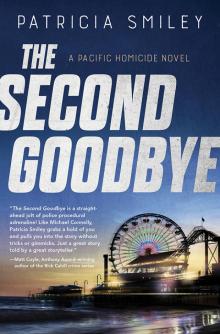 The Second Goodbye
The Second Goodbye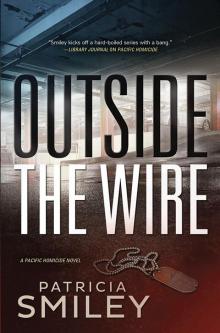 Outside the Wire
Outside the Wire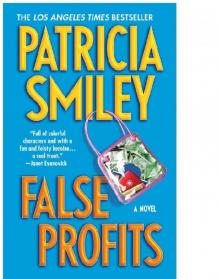 False Profits
False Profits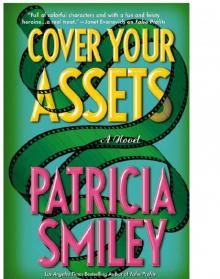 Cover Your Assets
Cover Your Assets Pacific Homicide
Pacific Homicide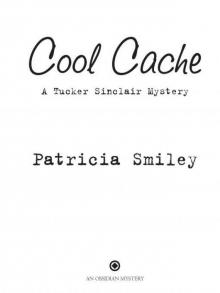 Cool Cache
Cool Cache